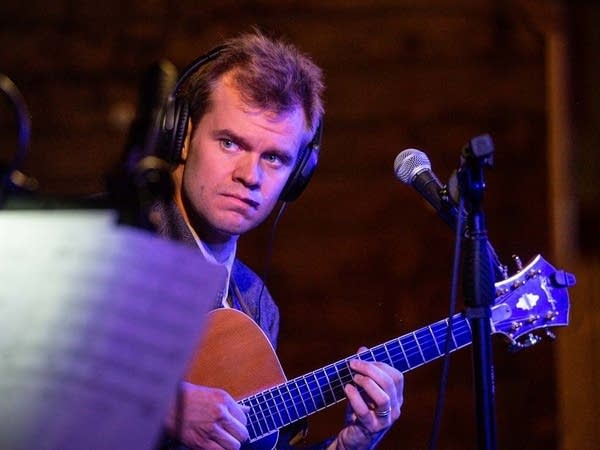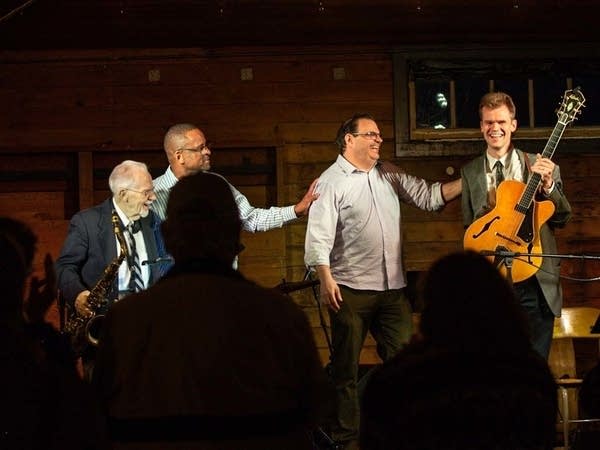The Improvised Life: Sam Miltich takes his message of jazz and mental health across Minn.

By the time Sam Miltich was 21, he was already living his dream. He had played in front of thousands of people at jazz festivals around the country, as far away as Europe and Japan. He had performed on the stage of the Lincoln Center for the Performing Arts in New York City.
Not bad for a kid who grew up hunting and fishing in the woods outside Grand Rapids, Minn., where he had taught himself how to play guitar — with the help of a few talented family members, and some instructional videos — by practicing for up to nine hours a day.
But by the time he turned 22, it had all started to unravel.
"Stuff started to come off the rails," he said. "And I didn't know what was happening. And I didn't know how to right the ship."
Create a More Connected Minnesota
MPR News is your trusted resource for the news you need. With your support, MPR News brings accessible, courageous journalism and authentic conversation to everyone - free of paywalls and barriers. Your gift makes a difference.
He was living in the Twin Cities. And at some point he remembers going to a studio session; he doesn't even remember where. But he distinctly recalls being asked to record another track, and then another.
"And I just started weeping, uncontrollably, and everyone's like, 'What is going on?'" he said.
Sam suffered what he describes as a major psychotic break, a total disconnect from reality. He thought about taking his own life. Eventually he was diagnosed with schizophrenia, a disease he assumed meant the end of his burgeoning music career.
Instead, more than a decade later, Sam Miltich, who's 33 now, has a fulfilling career as an accomplished jazz musician. And he's using his music and sharing his personal story in intimate detail to try to raise awareness and tolerance for people living with mental illness.

"I knew I was losing it"
Miltich's illness began in his early 20s with intense bouts of crying. Then fits of paranoia. He became convinced he was to blame for all kinds of terrible things happening in the world: When the I-35W bridge collapsed in Minneapolis, he was sure that was his fault.
"I was like locking myself in a closet because I thought the FBI or the CIA was coming for me," he recalled, sitting at the kitchen table in his small home in Grand Rapids with his wife, Katie Marshall.
"I was like, well, you better prepare for being in solitary confinement. So I'd lock myself in the closet in the dark" — for hours at a time.
"Sam was definitely suicidal at that point, and just very detached from reality," said Marshall. It was the mid-2000s and they were still dating, and living in the Twin Cities. "He thought the only way that he could save the world was that he had to end his life."
She remembers Miltich writing his thoughts down on pieces of paper, trying to explain his delusions.
"I knew I was losing it," Miltich said. "And you know our mind is the epicenter of who we are. And when you're losing your mind you're losing everything, you're losing yourself."
He struggled to keep performing. He couldn't structure his time to practice, he said. He couldn't even figure out how to change the strings on his guitar.
But slowly, he improved. It took about a year and several frustrating doctor and hospital visits, but he was finally diagnosed with schizophrenia. Eventually he found the right medication, at the right dosage.
He and Marshall moved back home to Grand Rapids. They gradually settled into a routine. They got married. His music career picked up again.
They had two sons.
"I really got a lot better when my first son was born," Miltich said. "It just provided a lot of structure for me, it gave me a lot of purpose. I just rose to the challenge. And those are still what I consider the happiest years of my life."
As he approached 30, he thought he had his mental illness figured out. He thought he could handle it on his own. "And I just kind of kept bumping the medication lower and lower and lower," he said.
Then the psychotic episodes returned.
This second time, he said, he was better equipped to deal with it. He knew his diagnosis. He just needed to accept it, so he could address it. But that wasn't easy.

"No one wants to accept they have schizophrenia," he explained. "Who wants to accept that? I thought, well, I'm toast. I've seen how people with schizophrenia get treated. They're going to think I'm dangerous, or they'll think I'm stupid and incapable. I felt super marginalized."
Looking back, Miltich said it took that second break from reality — eight years after the first one — to finally admit to himself that he had a severe mental illness. And once he was able to do that, Marshall said, it made a huge difference.
"He's been doing an amazing job of managing it," she said. "I feel like he's really kind of figured out what works and and how to work with it."
For a lot of people, this is where the story might end. But Miltich said he couldn't shake all the the frustration and anger he'd felt over the years: When he was chastised in the back of a squad car, on the way to the emergency room, while in psychosis. When doctors didn't understand what he was going through. When he feared people would be scared of him when they learned of his diagnosis. When cable news anchors attributed mass shootings simply to mental illness.
He was sitting on a park bench in Bozeman, Mont., a few years ago, thinking about all of that, he said, when he thought to himself, "You know what? I'm sick of this. I've got to do something about this. And I have a unique position because I am a performer and I can talk about this. And I said, 'Well, it's time.'"

The Improvised Life
So Sam Miltich began performing all around Minnesota — from Alexandria to Bemidji to International Falls — not just playing his music, but sharing his story.
He calls the performance "The Improvised Life." It's a mixture of music — accompanied by bassist Chris Bates, saxophonist Dave Karr and drummer Nathan Norman — interspersed with his personal story that he narrates with a frank openness.

At a recent event at a folk school in Bemidji, he sat on a dimly lit stage with the band behind him, a chandelier overhead, his fingers dancing across the neck of the guitar. He wore a blazer and skinny black tie.
It was an intimate performance, in front of a crowd of only about 30 people. And this band, he said, is made up of some of the most accomplished jazz musicians in the state. He's made it his mission to bring an art form typically associated with big cities to more rural pockets of Minnesota.
When Miltich first picked up a guitar, he was smitten with style of jazz popularized by guitarist Django Reinhardt. But his playing has broadened since then.
For this tour around the state, they're playing the work of legendary jazz pianist Thelonious Monk, alongside Miltich's own compositions. Miltich playfully told the audience they could decide whose music they preferred.
The choice is deliberate: Monk's music served as the soundtrack for Miltich's life when he was in the first confusing throes of his illness. Now, it's an inspiration to him, written by a musician who also lived with mental illness, but who also was able to build a successful career, and, like Sam, was a husband and a father.

Miltich also wants this show to help dispel what he calls the myth of the "mad genius," the crazy artist" — the pervasive idea that mental illness can somehow inspire creativity. It's a narrative that's persisted because of famous artists who have also had mental illnesses, like the painter Vincent Van Gogh, or Monk himself, who was sometimes dubbed "Mad Monk" in the press.
The idea took root because "it appeals to a certain romantic view that creativity is this divine inspiration, or gift, or curse, and it therefore has a price," said James Kaufman, an educational psychologist at the University of Connecticut who studies creativity.
Kaufman said studies do suggest some kind of link between mental illness and "genius-level" creativity. But he said that is balanced by many studies that show there is no cause and effect relationship: "Creativity doesn't lead to mental illness, and mental illness doesn't lead to creativity," he said.
But he worries that perception may too often be accepted as fact, which might lead someone to put off treatment, or stop taking medication, for example, out of the mistaken belief that it could stifle creativity.
On the contrary, Kaufman said, research suggests the biggest impediment to creativity is if someone is unable to work. To be creative, you have to be productive.
That's what Sam Miltich has found. When he was in the depths of his illness, he said, he struggled to practice, much less to perform.
"The fact I'm able to speak to you today and perform for you, is a reason for hope, because when I was in the depths of my illness, I could not have done what I am doing today," he told a recent audience in Bemidji.
And his creativity — his music — has helped him in his ongoing recovery. Because when he's playing his guitar, it becomes a form of mediation, he explained. He's completely immersed in the moment: "When I'm playing, I'm well."
A message of hope

Sam Miltich has performed The Improvised Life around rural Minnesota for the past year. He said the reaction has been incredibly positive. But it's also been emotional. Invariably, someone approaches him after a show, in tears.
He said he can relate to the stories they tell him of family members who have recently been diagnosed with a mental illness, or are struggling to take prescribed medication. He's been there. Audience members will often ask him for specific help, he said, which he can't offer. He's not a therapist, he tells them.
But what he can offer is a message of hope. That it can get better. And he said by talking about his journey so honestly, "it's almost like everyone is taking this collective deep sigh," and saying, "finally we can talk about this." He said when one person opens up, others realize they don't have to be afraid to follow.
"What we know from the research is the best way to change public attitudes is when people share their stories," said Sue Abderholden, executive director for National Alliance for Mental Illness in Minnesota.
"Because the more people that share their stories, the more likely it is that you as an individual, is going to connect to someone and say, oh well that's someone who could be my neighbor, oh that person is really a lot like me, and really then understand that mental illness can impact anyone."
And as more people receive that message, she said, that's how a movement is created that she said can lead to social change. Indeed, Sam Miltich said he sees mental illness as a civil rights issue.
So Sam Miltich is sharing his story, of suffering and hope, resilience and recovery, to one audience at a time, across Minnesota.

"Simply, I have schizophrenia, and I have a beautiful life. And that is the very point of this program," he told a hushed crowd at a recent show at the Rail River Folk School in Bemidji.
"Recovery from mental illness is real and possible. And quite frankly, in the words of George Gershwin: Who could ask for anything more?"


